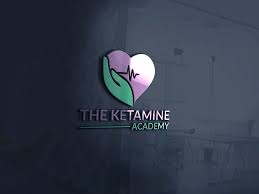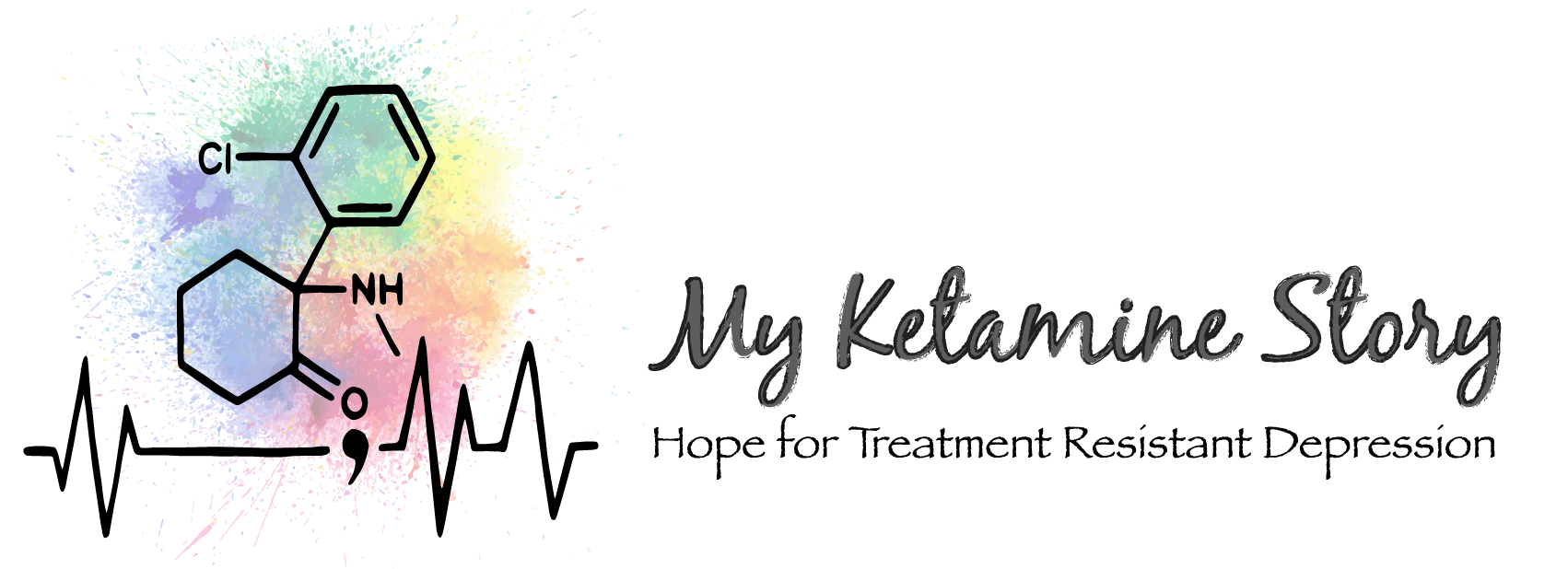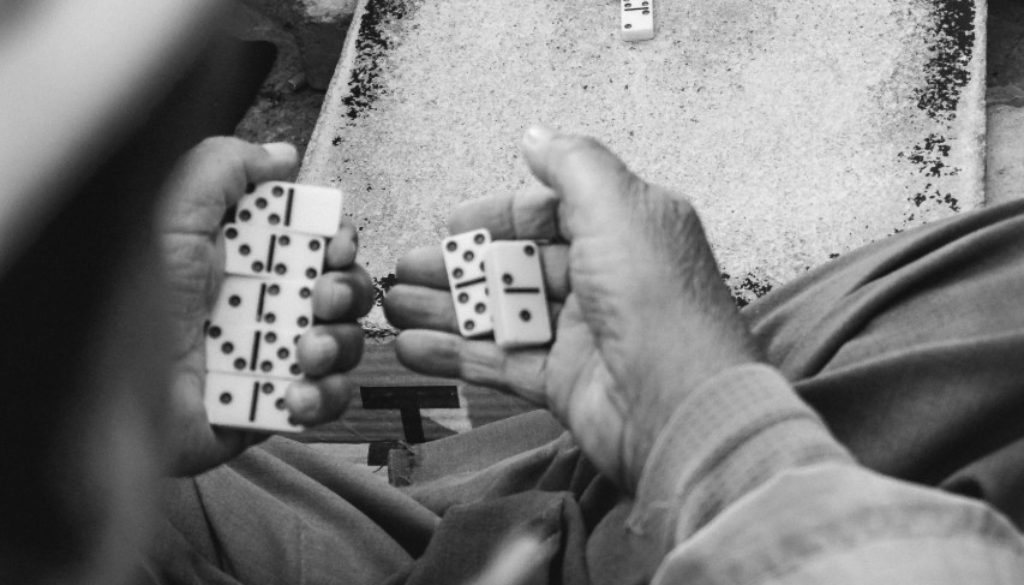Ketamine Therapy: Only Half Of The Equation When Managing Life With Treatment Resistant Depression
Hello all. This is Susan from myketaminestory.com.
I am a blogger that suffers with Treatment Resistant Depression (TRD), Anxiety and Obsessive Compulsive Disorder (OCD). I was introduced to Ketamine for TRD in January 2015. I am forever grateful that I was. I spent the first two years focused on my recovery. I now have an excellent treatment plan in place but that does not clear me from obstacles or pitfalls. I journal regularly. I educate and advocate for Ketamine Therapy to help treat depression.
I have a long history with treatment resistant depression and anxiety disorders. My mental health has been my primary focus; often without my permission.
In this blog, imagine if we looked at our Major Depressive Disorder like a design or pattern of domino tiles. What if Ketamine treatments are only part of the equation in managing our resistant depression and accepting our illness with an open mind and heart? What if the dots on the tiles signified coping mechanisms past, current and future? In this article, I would like to explore how perception, Ketamine therapy, behavioral modifications and cognitive therapies all play their part in healing as well as the outcome of recovery.
Ketamine therapy is a huge asset and consistently provides me relief from my profound depression. I want to add that perceptions are crucial for me, and changing the broken ways I look at my thoughts and feelings has allowed me much comfort over the past several years.
As I sit in front of my laptop the song, New Year’s Prayer by Jeff Buckley plays in my head. The meaning of his lyrics range in opinions, but what I hear is acceptance and grace. It may be due to my issues with identifying myself with my depression and desires to change that and view myself with a kind voice and a broader understanding that I am more than my sickness.
“Feel no shame for what you are. Feel no shame for what you are. Feel no shame for what you are. Fall in light. Fall in light. Fall in light….” -Jeff Buckley. I want to fall in light and have no shame for what I am or who I am. When I fall, it is straight into darkness. I am covered in shame.
Acceptance, which is a constant struggle for me, is needed.
I fight against what I am.
I think, I still confuse having a mental illness with who I am.
I am more than my illness.
Intellectually, I know this.
Emotionally, I do not.
Ketamine is my antidepressant. A fantastic one at that. I can be lifted into the light and function in the world that I live in.
I feel the dominos fall and I can sense the pressure, the weight, on me. One by one they fall and I can’t stop it. It is set in motion. One by one. I still crave the ability to hit pause. I covet and demand to have the skills to control my illness. I have logically realized that I must accept my brain chemistry and abnormalities, but. I always have a but. I insist on having the necessity to stop the dominos when I need to.
They fall. They cascade without my knowledge or understanding. I am not kind to myself when the symptoms return. They always do. It can be a slight tap on that first rectangular block, and I don’t always see the motion. There are times when I am aware that the game is about to begin and I feel the panic. One by one they tumble. I am ashamed. I want to close off the world. I want to freeze time so I can heal. I want to stop the progression. The moving forward. The tiles are too massive and they lean heavily on me. The motion is grand. It is a force I can’t stop. I can witness it happening. It makes me afraid.
Afraid of life.
Terrified of the desire to end it.
An intense and hateful disruption.
My life, sometimes, is in slow motion, and I feel a profound self loathing at my lack of finesse. I am incapable of controlling how my mind operates. I want to be that crafty, but years of failures proves to me that this illness is not about willpower or desire. If it were about tenacity, I would have been cured eons ago. I recognize that my brain developed differently, for whatever reason, and that lack of full comprehension and education trips me up. The emotional being that I am believes, oftentimes extremely convincingly to me, that I am being punished for not being “good enough”.
The if onlys chant inside my head.
However, I know that I am not my illness.
I will honestly admit that I resent those that stigmatise mental illness, but there are times when I am myself an active participant. It has been several years now that I have been able to find relief from my Treatment Resistant Depression, Anxiety Disorders and Obsessive Compulsive Disorder with the aid of Ketamine Therapy, yet I continue to identify myself with these labels. Tragically, I notice as I write this article that I repeatedly capitalize the words Treatment Resistant Depression, Anxiety Disorders and Obsessive Compulsive Disorder even when it is not warranted. I suppose that is about still giving my mental illnesses power and control. I plan to make every effort to discontinue allowing my disease to label me and stop it from feeling and appearing larger than life. That is how it has felt for decades, forceful and beastly. I am attempting to change my perceptions because Ketamine offers me relief from my symptoms for weeks at a time. I am capable. I want to fall in light and not darkness. A change in my way of thinking of myself and my illnesses. I am living. It is very helpful to remind myself of this simple concept every opportunity I get.
I am living.
I am not a label, nor my past.
Ketamine offers me a freedom from the exhaustive nature that is Clinical Depression; I mean clinical depression. I realize that the symptoms that have kept me prisoner for what felt like a lifetime because, let’s be honest here, I have been getting Ketamine for just over four years and that is tremendously minimal compared to the forty plus years I have been struggling to combat this crippling disease, so it is logical that it will take time to heal and restore.
Once again, I must remind myself that intellect doesn’t equate to emotional maturity.
Ketamine is a tool that gives me a key to explore and grow. I must learn to cope. I must face life on life’s terms, and I am not always successful at that task, but many without mental illnesses encounter problems with acceptance and just how baffling living fully can be.
I have realized that since I began my Ketamine therapy I smile; a lot. I catch myself. I giggle. It must be insane to witness. I want to be a child so it is acceptable to be this silly and gratuitous. I know I am a little girl learning how the world works all over again. This time without depression, on solid ground, depression free, it tends to be unwavering and clear. It feels that way to me, after I receive my Ketamine, for the two weeks following my treatments. I am experiencing reality with young eyes, and it is remarkable and worth breathing in. I just feel a full sense of peace surrounding me, encasing me. It welcomes me back to the living. I embrace it. I have a calm clarity. The fog is lifted and I see the wildflowers once again. The colors are stunning. I am not lying when I say that the world looks in super sharp focus. My thoughts and insight crystal clear. It isn’t hazy. The depression is at bay.
I realize as I am writing that I have used this description before, but it works for me so I will reiterate. The closest thing I can compare the intense depression to is a nasty head cold. Remember that feeling? When you fight your way through those miserable days with tissues and cold medicine hoping to get to the other side without your head exploding. You know, when you reach a point where you are stuffy, can’t breathe, throat hurts from breathing through your mouth, your head is pounding stronger than the base on your child’s car stereo and your only desire is to shut that all down fast. You want to die. Yes? Maybe? Well, if you were to multiply that by a number close to infinity you might experience what my world was like daily, because that feeling and numerous others never goes away for those with treatment resistant depression. It was relentless for me until I started seeking help from my doctor with Intramuscular Ketamine injections. I pray that this description might allow you to have a small glimpse into clinical depression. I will admit, nothing my past doctors tried made it possible to get rid of that pesky, deadly head cold. Ketamine destroys that hypothetical head cold and the relief is phenomenal. I am no longer weighed down and sickly. I can breathe. I feel alive and ready to explore.
It has been a week since my last Ketamine shot. I kept wanting to sit down and create an amazing blog describing this sensational process of recovery. The days following my Ketamine therapy I have so many ideas and topics to discuss. I’ve been asking myself a multitude of times why is it so easy for me to make the commitment to write when my world is falling apart, when the domino tiles are tumbling and I am symptomatic, yet I can’t find an hour to share how incredible Ketamine is for depression.
I finally figured out a couple reasons I find it easier to write when the depression resurfaces. It is familiar and I have spent my lifetime, as far back as I can remember, writing during these circumstances and distress. It has been a very personal coping mechanism for me to get through during the pandemonium.
I am delighted and slightly ashamed to admit the other reason.
Can anyone guess why?
It feels good in a way to put these findings down on paper.
I mean, it is incredible.
All these new discoveries, they are so exciting to me. I breathe in life and exhale the pain; easily. I am living. I am no longer locked up in my safe home afraid to involve myself in anything outside my own misery. I am not isolating. I am no longer a prisoner. Ketamine is my key and I am capable of unlocking the door to my mental dungeon. I feel good. I want to…. live.
I have the ability. I feel confident. I want to take advantage of this time. I guess I am still having issues with trust. I write that down reluctantly. I am terrified that the effects the Ketamine allows me will disappear. The depression resurfaces. That is a reality that I resist. Maybe I am hesitant to scribe my thoughts of wellbeing out of a strange and obscure superstition; one that I unconsciously entertain that leads me to believe that it will be taken away from me.
The reality is that I have a mental illness that I can’t and probably won’t be free permanently from that fact. I used to be blinded by the terror of my symptoms. I would get incredibly angry. I would spend countless hours trying to predict when the depression would return.
I would search for it.
I would investigate every thought. I would rob myself of the time I had free from my symptoms trying to prepare for the ultimate doom. I would question my abilities to think and process. I would build walls to keep the demons away. I thought if I could see them coming I could shut them out. I could protect myself. I was naive. I am not that powerful. I know I will crash and tumble into pits so low I fear a rope will never reach me.
I resent having that fear.
I work regularly on these resentments and gain a sense of peace at knowing I can’t control my biology. It is like a hall pass of sorts.
After four years utilizing Ketamine as my trusted lanyard, my ability to handle the rocky times have improved. I am aware that when the fear arises it is typically an issue with acceptance of what is. I can’t stop living during the times when I am symptom free out of the terminal dread I associate with my depression.
I have a toolbox full of coping strategies.
I use them.
I falter.
I can’t always distinguish which tools will work or help me. It was only recently my therapist pointed out all the techniques I was using, as well as my successes, that I had an epiphany. I could see neither how the tools were helping me or the positive outcomes. I have learned that I minimize or dismiss my achievements especially when I am spiraling down. When my depression filter is present all I want is reprieve. I would cycle through many techniques of healthy coping without successes I could measure or acknowledge. I assumed these coping strategies were failing. I was failing. When my therapist brought to my attention all the tools I was using and the results because of them, I was astonished.
I was genuinely flabbergasted.
I remember bluntly stating to her, “Well, I am still feeling depressed so they must not be working!”
If I am applying many of my coping mechanisms properly shouldn’t I feel better? I am using the tools that have been taught to me over the years but it never seems good enough. I must be doing something wrong. I must be forgetting that one gadget that will propel me forward and through the darkness.
It was during that session that I made a huge discovery; the connection.
I still believe I can control my illness.
I also wholeheartedly deemed myself a failure because the depression was present even after my many attempts to banish it.
My therapist identified the tools I was using and all the things I was able to do, to accomplish, while feeling the return of my depression. They are not failures, but achievements. Celebrate the successes. Pride yourself on the small steps you are taking she would gently remind me.
But……
The depression is still showing its ugly face, I would whine.
I have my eyes on the goal, and that is to rid myself from my depression. I don’t want to feel it; ever.
Unrealistic?
Sure.
However, I really thought that was what the toolbox was all about. If I use the strategies I have been taught it would relieve the depression. What I learned from a recent therapy session was these tools are for managing my life, not to eliminate the thoughts and sensations when the depression wants to take me prisoner and throw away the key.
Shocking.
Depression demands my attention. I adjust. It shouts louder. I pick up another tool from my box of tricks. I dodge. It seeks me out. I often feel exhausted and defeated.
I wasn’t seeing how I was doing things differently. All I knew was it wasn’t going to leave me alone no matter what I did.
Let us return to the domino analogy.
The little successes that I am skipping over during a depressive episode before my next Ketamine appointment have their purpose. What I am doing differently now allows the tiles, maybe only one tile but that is all it might take to shift the block and momentarily break the flow. We have all witnessed this phenomenon. The dominos are lined up. They look perfect. There is no flaw in the pattern. Once that first tile is pushed it races to the end. That first block quickly sets off a reaction. We think we know the outcome. Right? We have predictions. It only takes a micro fraction, unseen to the designer, to skew results. The rectangular blocks abruptly stop. It takes time for the presenter to approach the design, make corrections and begin the sequence over again.
My defenses, aka behavioral modifications, self talk, and cognitive therapy tricks, create that hiccup. I may feel a short burst of reprieve; if only temporarily. It does occur. I may not be paying attention to it but it is happening. It is what allows me to get out of bed, shower, brush my teeth, reach out to my support network for encouragement, and go to work. These occurence seem so ordinary to me. I take them for granted. The ability to question my thoughts, observe my feelings, and react differently have been developed and shaped over the past several years. These skills are on autopilot. It has been my constant use and evolution of these skills in my toolbox that has made my default settings improve and change. I don’t give myself credit for the work I have done over the years to change the way I operate. I seem to pay more attention to the fact that the tile is upright and in motion and once again the outcome is still the same; intense, unacceptable depression.
Could it be that the tiles in my domino design are actually my life, and the off-centered block is my depression ???
Interesting.
That is something I, and others suffering with clinical depression, may want to address or think about. Ketamine is only half of the equation. We still have work to do and oftentimes that may include adjusting our perceptions, our colorful tiles, about our illness and recovery.
If you are interested in educating yourself further on Ketamine therapy for Treatment Resistant Depression, check out the four-part series I wrote answering questions about Ketamine use, based on my experience with Ketamine therapy over the past four years.
My first blog, Ketamine: Addressing Questions & Concerns focused on my early experience with Ketamine Infusions.
In part two of the series, Addressing Questions & Concerns About Ketamine Therapy for Treatment Resistant Depression I addressed questions and concerns about Intramuscular Ketamine verses Ketamine Infusion therapy.
In my third blog, Frequently Asked Questions: Redefining Depression With The Assistance Of Ketamine Therapy, I was a bit more random. I had emails with several questions and themes, and I addressed as many inquiries as I could.
In my final question and answer dialogue, Pondering Concerns & Questions: The Benefits Of Ketamine For Treatment Resistant Depression, I discussed research, clinical studies, and the need for changes to occur within our insurance companies and federal government so that maybe one day Ketamine will not be so difficult to afford or obtain, from any qualified professional.
I hope these personal blogs from a patient that suffered for over four decades with treatment resistant depression will be helpful in convincing you why Ketamine could help you or someone you love.
Also, if you would like to become a provider of Ketamine Therapy try enrolling in The Ketamine Academy‘s online Ketamine Infusion Therapy training course; it would be an excellent decision and could be extremely helpful for others like me. The Ketamine Academy online program will surely benefit you and the mental health community.
I have been generating a Ketamine Providers and Locations list and I update it regularly. Please visit my personal website for the full provider list. This list may help you find a clinic in your city or state. I update the provider list regularly. I highly recommend individuals contact me if you administer Ketamine or if you are aware of a Ketamine provider not in my directory; I will happily add new Ketamine clinics.
In conclusion, If you know of anyone suffering with treatment resistant depression, like I do, let them know that Ketamine therapy may be an option worth looking into. It has been and continues to offer me relief from my symptoms.
Originally posted on The Ketamine Academy website.





